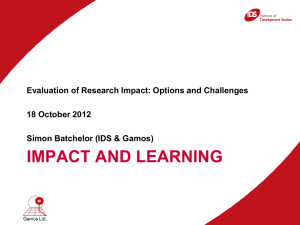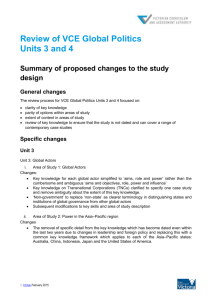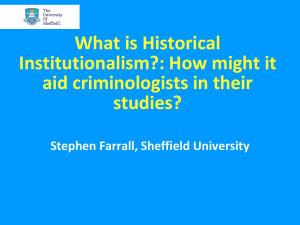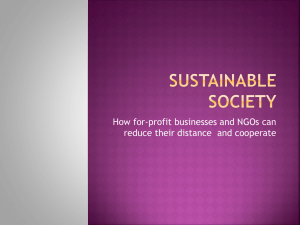Programme
advertisement
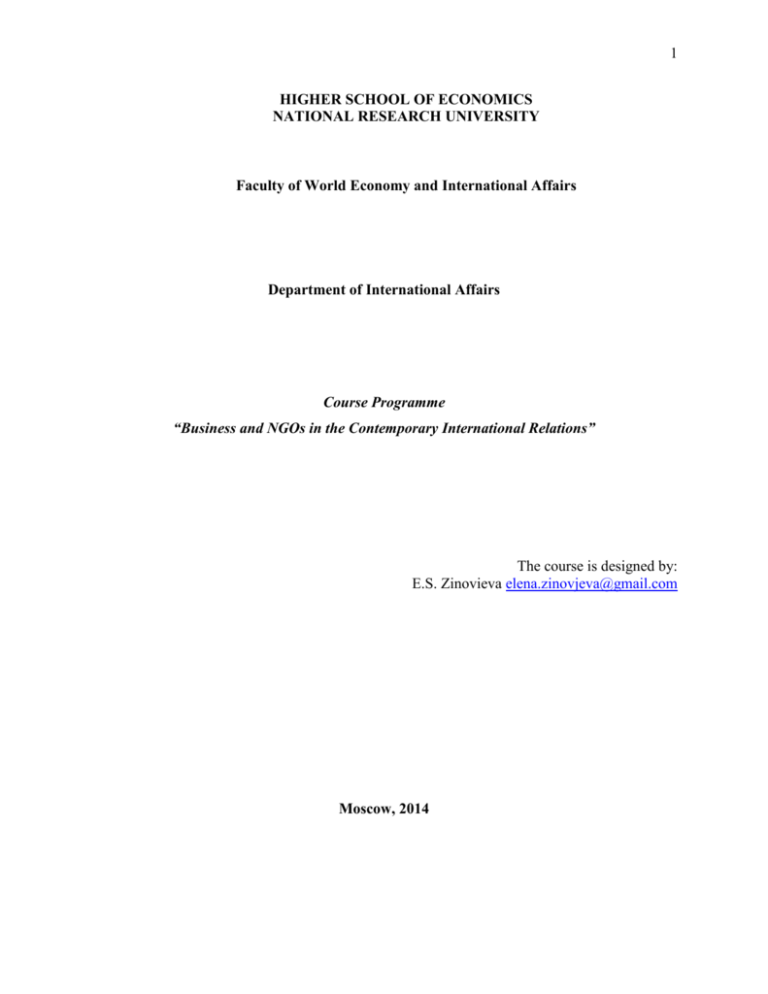
1 HIGHER SCHOOL OF ECONOMICS NATIONAL RESEARCH UNIVERSITY Faculty of World Economy and International Affairs Department of International Affairs Course Programme “Business and NGOs in the Contemporary International Relations” The course is designed by: E.S. Zinovieva elena.zinovjeva@gmail.com Moscow, 2014 2 Course description The course is designed to provide students with the working knowledge of the major issue areas surrounding transnational business and nongovernmental organizations (NGOs) in international relations and thus develop deeper understanding of the complexity of contemporary world politics. The course is designed for master students with diverse backgrounds, including International Relations, History, Political Science, and International Economics. Students should be acquainted with general trends in the contemporary world politics and international relations as well as basics of international relations theory. The course emphasizes the importance of students’ independent reading and research, thus each part opens up with an introductory lecture followed by a discussion of the reading materials (which include articles by J. Nye, R. Keohane, J. Rosenau, S. Strange, D. Held, M. Castells etc.). The reading materials include basic, classical works and modern, state of the art of international relations research papers of leading scholars. After the discussion students present research projects, which may be focused on the international political results of certain transnational companies or NGO activities or their role in the shaping of international political agenda. By the end of the course students should be acquainted with the main fields of transnational activities of transnational business and NGOs, their influence on the transformation of the Westphalian world order and on the shaping of the international agenda, and also should be able to analyze international events taking into account the role of transnational actors. Prerequisites This course is intended for Master’s level students. It is expected that students are aware of the basic concepts of international relations and international relations theories as well as familiar with basic process and trends in global politics. Learning objectives The main goal of the course is to provide students with the understanding of the activities of businesses and non-governmental organizations as international actors. The course is designed to teach students to: understand the nature of contemporary international relations, the role of nongovernmental organizations and business entities as international actors; understand the changes taking place in the world political system; evaluate the interests of different non-governmantal actors ; analyze the activity of the actors on the world stage, identify the consequences, challenges and opportunities arising from their activities; critically evaluate the tools offered by different theoretical schools and approaches for analysis of international relations actors (business and NGO ); be able to use their skills in the analysis of international problems , identify interests , positions , resources of different actors , prospects for resolving different international problems; 3 understand the role of business organizations and non-governmental organizations in the global governance ; analyze the process of interaction among different governmental and nongovernmental actors and understand the prospects and limitations of multi-level diplomacy; perform individual and collective research projects (writing analytical notes, scenarios, models, etc.) and submit their results , be able to use scientific terminology to master the skills of debate. Course Outline № Topics № Course Hours Academic/Contact Hours Lectur es Self-study Hours Semina rs Transnational 1 Actors in the Contemporary Global Politics. 6 4 2 10 NGOs an international actors 16 8 8 36 Radical and protest movements and extremist organizations in World Politics 8 2 6 12 Transnational companies and Transnational Banks as international actors 16 8 36 36 Multi-level diplomacy and Global Governance: interaction among governments and non-governmental actors 6 2 4 10 4 Negotiating new international agenda: interaction among governments and non-governmental actors. In sum: 4 2 2 10 56 28 28 106 Curriculum Topic 1. Transnational Actors in the Contemporary Global Politics. Lecture: 1. 2. 3. International relations and world politics. The transformation Westphalian political order. Transnational politics. Definitions of political actors and their role on the world stage. Comparative analysis of actors’ resources, goals, interests, structural organization. State as the most influential actor on the global stage. States and intergovernmental organizations as political actors. Erosion of state sovereignty. Non-governmental transnational actors. The growing diversity of actors. The problem of accountability of non-governmental actors. Topics for discussion: • Transformation of the Westphalian world order: the political reality or analytical utopia? Critical analysis of the arguments of both points of view. • Characteristics of business and NGOs as independent actors in international relations. Reading List: Required: 1. Kegley Ch., Blanton Sh. World Politics: Trends and Transformations, 2011-2012 Update Ed. Cengage Learning, 2011. Part 2. The Globe’s actors and their relations. 2. Keohane R., Nye J. Introduction // Transnational Relations and World Politics / R. O. Keohane, J.S. Nye (eds.). Cambridge (MA): Harvard University Press, 1972. 3. Risse T. Transnational Actors and World Politics // Handbook of International Relations / Ed. by W. Carlsnaes, T. Risse, B. Simmons. London: Sage, 2002. - P. 255–274. Recommended: 5 1. The Globalization of World Politics: An Introduction to International Relations / J. Baylis, S. Smith, P. Owens. - Oxford University Press, 2011. Chapter 20. Transnational actors and international organizations in global politics. 2. Rosenau J. The Study of Global Interdependence: Essays on the Transnationalisation of World Affairs. - London: Frances Pinter, 1980. 3. Slaughter A. A New World Order. Princeton: Princeton University Press, 2004. Introduction. 1-35. 4. Power and Interdependence. World Politics in transition / R. Keohane, J. Nye, eds. 3rd edition. New York: Addison Wesley Longman, 2001 Topic 2. NGOs as political actors. Lecture: 1. International NGOs as key players in global politics. Definitions of INGO, their evolution, legal and financial status. The extent of the engagement of NGOs in global policymaking. NGOs and globalization. 2. The variety of NGOs on the international arena (humanitarian, environmental, human rights’ and other specialized organizations), their structure, membership and activities, and their complex relationship with social movements and civil society. Challenges and achievements of each type of NGOs. 3. Interaction of NGOs with other actors in international relations. NGOs and states. The rise of state-sponsored INGOs. NGOs and international organizations. Consultative status at UN for NGOs. NGOs and business: conflict and cooperation. 4. INGOs role in resolving of international conflicts. 5. Theoretical approaches to the study of the NGOs’ role in global politics. Case studies: NGOs activities in the Landmines Ban Campaign. INGOs and the Multilateral Agreement on Investment. NGOs and Internet regulation at the international level. The role of NGOs in international conflict resolution (conflict on the student's choice). Reading List: Required: 1. Keck M., Sikkink K. Activists Beyond Borders: Advocacy Networks in International Politics. Cornell University Press, 1998. – 228 p. 2. Union of International Associations. The Yearbook of International Organizations. 2013. Mode of access: http://www.uia.org/yearbook 3. Willets P. Non-Governmental Organizations in World Politics: The Construction of Global Governance. London: Routlege, 2010. Recommended: 1. Charnovitz S. Nongovernmental Organizations and International Law // The American Journal of International Law. 2006, 2 (100), 348-372. 6 2. Keohane R., Nye J. Globalization: What’s new? What’s not? (And so what?) / Foreign Policy, 2000, 104-119. 3. Non-state actors in international relations. / Ed. by Arts B., Noortmann M., Reinalda B. Aldershot: Ashgate, 2001. 4. Sundstrom L. Foreign Assistance, International Norms, and NGO Development: Lessons from the Russian Campaign // International Organization, 2005, No. 2 (59), 419-449. Topic 3. Radical and protest movements and extremist organizations as political actors Lecture: 1. Protest movements (ethnic, religious, anti-globalist, etc.) as international actors. Types and examples of protest movements. 2. Terrorist groups and extremist organizations in world politics. 3. Public opinion, global media and internet as factors strengthening extremist and radical movements. Topics for discussion: Financial crisis 2008-9: reflection in the alter-globalist discourse Protest and radical movements in the Internet era: new agenda Terrorist movements in the contemporary international relations: a challenge to the realist image of the world? Reading List: Required: 1. Kegley Ch., Blanton Sh. World Politics: Trends and Transformations, 2011-2012 Update Edition. Cengage Learning, 2011. Part 2. The Globe’s actors and their relations. 2. The Globalization of World Politics: An Introduction to International Relations / J. Baylis, S. Smith, P. Owens. - Oxford University Press, 2011. Chapter 20. Transnational actors and international organizations in global politics. Recommended: 1. Bhagwatti J. Coping with Anti-Globalization // Foreign Affairs, 2002, 1. URL: http://www.foreignaffairs.com/articles/57614/jagdish-n-bhagwati/coping-withantiglobalization-a-trilogy-of-discontents 2. Chomsky N. Profit over people: neoliberalism and global order. - Seven Stories Press, 1999. - 175 p. 3. Esposito J. Unholy war. Terror in the name of Islam. – NY: Oxford University Press, 2002. 4. Steger M., Wilson E. Anti-Globalization or Alter-Globalization? Mapping the Political Ideology of the Global Justice Movement. // International Studies Quarterly, 2012, 3(56), 439–454. 5. Why Do Ethnic Groups Rebel? New Data and Analysis / L.-E. Cederman, A. Wimmer, B. Min // World Politics, 2010, 62(1), 87-119. 7 Topic 4. Transnational Companies and Transnational Banks as international actors. Lecture: 1. TNCs as actors in contemporary international relations . Resources and channels of influence . The problem of lobbying and corruption. Internationalization of small and medium-sized business (born global). The rising amount of non-western TNC in international ratings. 2. 2 . Examples of TNCs as actors. Interests and resources of different types of TNC (energy, IT, media, etc.), their impact on global politics. 3. Transnational business and the loss of state sovereignty. Damage to the security and autonomy of weak states. The phenomenon of private military companies, the commercialization of security, space, etc. 4. Financial structures as political actors. The influence of ICT development on the financial sector . Financial flows and the loss of sovereignty. 5. The shadow economy. UN's role in fighting transnational corruption and shadow economy. 6. Russian business on the international arena. Case studies: Comparative analysis of the characteristics of activities of business structures in different regions of the world. Features of interaction between business and NGOs during a campaign for the abolition of the Multilateral Agreement on Investment. Social responsibility of business - a conscious choice or coercion of the international system? Analysis of the resources and interests of businesses in various economic sectors (student's choice) Reading List: Required: 1. The Globalization of World Politics: An Introduction to International Relations / J. Baylis, S. Smith, P. Owens. - Oxford University Press, 2011. Chapter 20. Transnational actors and international organizations in global politics. 2. UNCTAD, Division on Transnational Corporations and Investment. World Investment Report. New York, UN, 2013. Recommended: 1. Acs Z.J. Small and Medium-sized Enterprises in the Global Economy. - Ann Arbor: The University of Michigan Press, 2004. – P. 7-16. 2. Bieling H. The Other Side of the Coin: Conceptualizing the Relationship between Business and the State in the Age of Globalisation // Business and Politics. – 2007. - №3 (9). 8 3. Fujita М. Small and Medium-sized Transnational Corporations: Salient Features / / Small Business Economics. - 1995. - № 7. 4. Jensen N. Nation-States and the Multinational Corporation: A Political Economy of Foreign Direct Investment. - Princeton University Press, 2006. 5. Schmidt V.A. The New World Order, Incorporated: The Rise of business and the Decline of the Nation State // Daedalus.- Spring 1995. – V. 124. - №2 – P.75-106. 6. Strange S. States, Firms and Diplomacy // International Affairs, 1992, 1(68), 1-15. Topic 5. Multi-level diplomacy and Global Governance: interaction among governments and non-governmental actors Lecture: 1. Interaction of actors and changing Westphalian world order. The problem of matching diverse interests of different actors. 2. Principles of global governance. The role of business organizations and NGOs in global governance. The phenomena of private global governance, the role of TNC and NGOs. 3. Multi-level diplomacy (network diplomacy, track II diplomacy) as a form of interaction and negotiation among different actors. Examples. State as the leading and coordinating actor in multi-level diplomacy. Case studies: Multi-level cooperation during international conflicts. Interests of the various actors. (conflict selected by students) Multi-level cooperation in countering terrorism. Multi-level cooperation during the UN summit (meeting on student's choice). Multi-level cooperation during the World Summit on the Information Society (Geneva 2003, Tunis 2005). Examples of private forms of global governance, their efficiency and problem of accountability (on student’s choice). Reading List: Required: 1. Castells M. The New Public Sphere: Global Civil Society, Communication Networks, and Global Governance. // The ANNALS of the American Academy of Political and Social Science March 2008 vol. 616 no. 1. РР. 78-93 Recommended: 2. Alexander D. Business Confronts Terrorism: Risks and Responses. Wisconsin.: University of Wisconsin Press Terrace Books, 2004. 3. Companies in a World of Conflict: NGOs, Sanctions and Corporate Responsibility / Ed. by J. Mitchell. Royal Institute of International Affairs and Earthscan Publications, 1998. 9 4. Graz J., Nölke A. Transnational private governance and its limits. – London: Routledge, 2007. 5. NGOs, the United Nations, and global governance / Ed. by Weiss T., Gordenker L. – London: Lynne Rienner Publishers, 1996. – 250 p. 6. Nye J. The future of power. NY: Basic Books, 2011. 7. Rosenau J., Czempiel E. Governance Without Government: Order and Change in World Politics. — Cambrige: Cambridge University Press, 1992. – 311 p. 8. Sinclair T. The Infrastructure of Global Governance: Quasi – Regulatory Mechanisms and the New Global Finance. // Global Governance. 2001, Issue 7. Pp. 441 – 451. 9. Weiss T. What Happened to the Idea of World Government? // International Studies Quarterly. Volume 53, Issue 2, June 2009. Pp 253–271. 10. The Emergence of Private Authority in Global Governance / H. Bruce and T. Biersteker, eds. Cambridge: Cambridge University Press, 2002. Topic 6. Negotiating new international agenda: interaction among governments and non-governmental actors. 1. 2. 3. 4. 5. Lecture: International processes: globalization, localization, integration and disintegration , democratization, economization. The role of business and NGOs in the contemporary international processes. Security problems. Interests, resources, and activities of TNCs and NGOs in international conflicts . Terrorism and non-proliferation problem. The role of business in countering terrorism . Environment and resources. Ecological problems: the role of business and NGOs. Social responsibility of TNC. Migration issues : the role of business and NGOs. Science and technology on the international agenda . Business and innovation . Space commercialization , education and other information and communication technologies and the information society . NGO's position . Business and NGO’s in the humanitarian sphere. The concept of " soft power". Commercialization of education. Business and "great sport ." Public opinion and global civil society. Case studies: Students choose the problem and analyze the role of business in its appearance on the international agenda Students choose international political problem and analyze the role of NGOs in its appearance on the international agenda Reading List: Required: 1. The Globalization of World Politics: An Introduction to International Relations / J. Baylis, S. Smith, P. Owens. - Oxford University Press, 2011. Chapter 33. Globalization and the post-cold war world order. 10 Recommended: 1. Alexander D. Business Confronts Terrorism: Risks and Responses. Wisconsin.: University of Wisconsin Press Terrace Books, 2004. 2. Companies in a World of Conflict: NGOs, Sanctions and Corporate Responsibility. / Ed. by J. Mitchell. Royal Institute of International Affairs and Earthscan Publications, 1998. 3. Graz J., Nölke A. Transnational private governance and its limits. – London: Routledge, 2007. 4. Held D., McGrew A. Globalization/Anti-Globalization: Beyond the Great Divide. Polity, 2007. 283 p. 5. Nye J. The future of power. NY: Basic Books, 2011. 6. Sklair L. Democracy and the Transnational Capitalist Class // International Political Science Review, 2002, 23 (2), 159 – 174. Teaching and Learning Activities Course grade: The sum of the grades for class participation and discussion of the required and recommended reading, presentation of the research project (case study) and written examination will be translated into a numerical grade according to the corresponding ranges below: Class participation and discussion – 30% Presentation of research project (case study) – 40% Written examination – 30% Students are required to prepare and present a research project, representing the role of transnational actors (business and NGO) in the global politics on a case study. Examples of international problems and issues for case studies are provided in the course programme, Students may choose other case after consultation with the lecturer. Presentation is a individual or group research project, whereby students apply theoretical concepts, presented in the reading material and discussed at seminars, to the analysis of the international problems, issues and processes. Examination questions 1. Transformation of the world political order: the impact of business and NGOs. 2. Business and NGOs as political actors. Characteristic features of a political actor on the international stage. 3. Global governance: the role of different actors. 4. Characteristic features of the multi-level diplomacy in the modern world . 5. Russian business on the international arena . 6. Interaction of actors in humanitarian intervention (example on student's choice ) . 7. Interaction of transnational actors in the humanitarian sphere . 8. International sport - business or ideology? 11 9. Business and NGOs in the contemporary international conflicts 10. Media companies as political actors 11. Business in international conflicts (conflict on student’s choice ) . 12. INGOs role in conflict resolution (conflict in the student's choice ) . 13. Political actors in the global educational sphere their resources and interests. 14. Transnational terrorism as a challenge for the Westhpalian world order 15. New technologies: benefits and threat for transnational actors 16. NGOs’ role in the global environmental negotiations 17. TNCs’ role in the global environmental negotiations 18. Multinational banks as political actors 19. Small and medium sized business as an international actor (“born global”) . 20. Religious movements as actors in global politics. 21. Globalization vs. regionalization : the interests of the various actors (business and NGOs). 22. Neo-liberalism on the role of business and NGOs as political actors. 23. Corruption at the transnational level : actors and mechanisms (with examples). 24. New trends in the international agenda: the reflection of non-state actors’ interests 25. Public-private partnerships on the international level (with examples) 26. Anti-globalization movement’s influence on the international agenda 27. Transnational terrorism and the erosion of the political system in the world. 28. Protest and radical movements as actors in global politics


